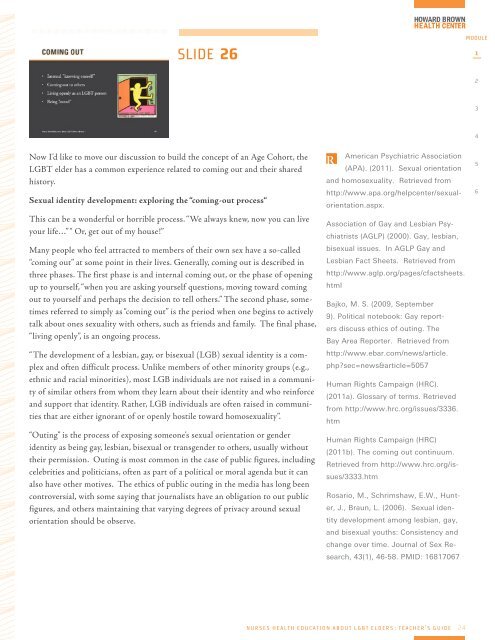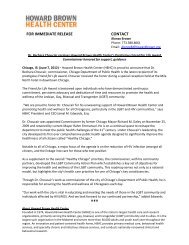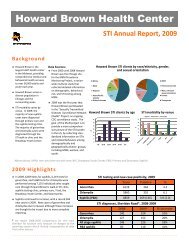An Introduction to LGBT Elders - Howard Brown Health Center
An Introduction to LGBT Elders - Howard Brown Health Center
An Introduction to LGBT Elders - Howard Brown Health Center
- No tags were found...
You also want an ePaper? Increase the reach of your titles
YUMPU automatically turns print PDFs into web optimized ePapers that Google loves.
SLIDE 26MODULE1234Now I’d like <strong>to</strong> move our discussion <strong>to</strong> build the concept of an Age Cohort, the<strong>LGBT</strong> elder has a common experience related <strong>to</strong> coming out and their sharedhis<strong>to</strong>ry.Sexual identity development: exploring the “coming-out process“This can be a wonderful or horrible process. “We always knew, now you can liveyour life…” “ Or, get out of my house!”Many people who feel attracted <strong>to</strong> members of their own sex have a so-called“coming out” at some point in their lives. Generally, coming out is described inthree phases. The first phase is and internal coming out, or the phase of openingup <strong>to</strong> yourself, “when you are asking yourself questions, moving <strong>to</strong>ward comingout <strong>to</strong> yourself and perhaps the decision <strong>to</strong> tell others.” The second phase, sometimesreferred <strong>to</strong> simply as “coming out” is the period when one begins <strong>to</strong> activelytalk about ones sexuality with others, such as friends and family. The final phase,“living openly”, is an ongoing process.“The development of a lesbian, gay, or bisexual (LGB) sexual identity is a complexand often difficult process. Unlike members of other minority groups (e.g.,ethnic and racial minorities), most LGB individuals are not raised in a communityof similar others from whom they learn about their identity and who reinforceand support that identity. Rather, LGB individuals are often raised in communitiesthat are either ignorant of or openly hostile <strong>to</strong>ward homosexuality”.“Outing” is the process of exposing someone’s sexual orientation or genderidentity as being gay, lesbian, bisexual or transgender <strong>to</strong> others, usually withouttheir permission. Outing is most common in the case of public figures, includingcelebrities and politicians, often as part of a political or moral agenda but it canalso have other motives. The ethics of public outing in the media has long beencontroversial, with some saying that journalists have an obligation <strong>to</strong> out publicfigures, and others maintaining that varying degrees of privacy around sexualorientation should be observe.RAmerican Psychiatric Association(APA). (2011). Sexual orientationand homosexuality. Retrieved fromhttp://www.apa.org/helpcenter/sexualorientation.aspx.Association of Gay and Lesbian Psychiatrists(AGLP) (2000). Gay, lesbian,bisexual issues. In AGLP Gay andLesbian Fact Sheets. Retrieved fromhttp://www.aglp.org/pages/cfactsheets.htmlBajko, M. S. (2009, September9). Political notebook: Gay reportersdiscuss ethics of outing. TheBay Area Reporter. Retrieved fromhttp://www.ebar.com/news/article.php?sec=news&article=5057Human Rights Campaign (HRC).(2011a). Glossary of terms. Retrievedfrom http://www.hrc.org/issues/3336.htmHuman Rights Campaign (HRC)(2011b). The coming out continuum.Retrieved from http://www.hrc.org/issues/3333.htmRosario, M., Schrimshaw, E.W., Hunter,J., Braun, L. (2006). Sexual identitydevelopment among lesbian, gay,and bisexual youths: Consistency andchange over time. Journal of Sex Research,43(1), 46-58. PMID: 1681706756Nurses <strong>Health</strong> Education About <strong>LGBT</strong> <strong>Elders</strong> : Teacher’s Guide24















